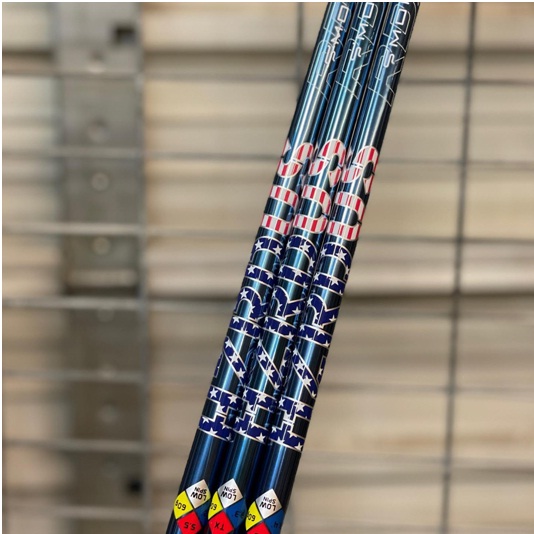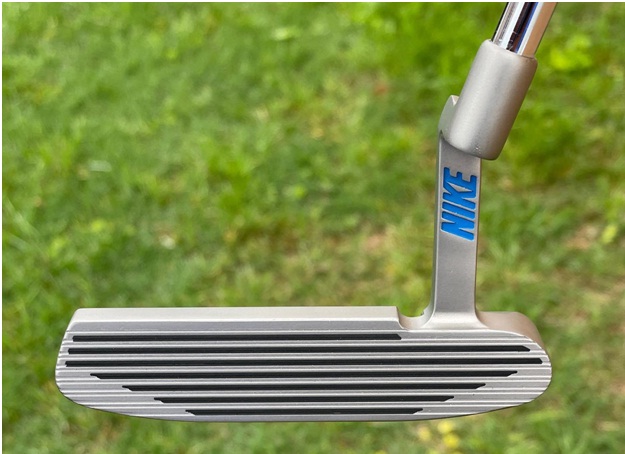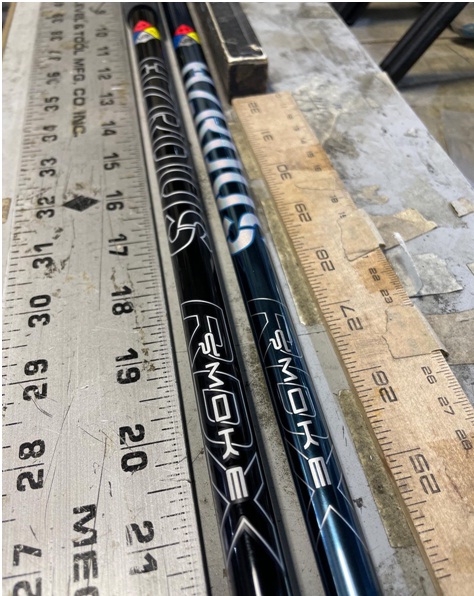Let’s Field Some FAQs about Golf Shafts for Sale
Posted by Dallas Golf on 30 Jun 2021

Golf is a sport that garners immense mystique and prestige, and some many golfers practice their whole lives chasing professional aspirations. There are perhaps more moving parts in golf than there are in any other sport, and players, both experienced and inexperienced, are going to come across - or come up with - some of these following questions at one point or other.
These are some of the more common questions that golfers ask or wonder about golf shafts for sale, so check them out and see if any of them applies to you. If not, and you’re still left pondering the “whats” and “hows,” feel free to get in touch with our customer service team and we’ll see how we can help you out!
1.What is shaft flex?
Shaft flex refers to how much a golf shaft will bend and thereby load during a swing, and is related to how much energy it can store and then impart to the ball. Shafts are typically rated on a scale that ranges from senior, ladies, regular, stiff and extra stiff.
There is no universal scale that measures the stiffness of golf shafts for sale, and different manufacturers may have different specifications for their stiffness ratings, but regardless, amateur, senior and ladies’ flexes will be higher than those of regular, stiffer and extra stiff shafts, with extra stiff shafts (sometimes referred to as XS) being the stiffest of them all.
Shaft stiffness is one of the most important criteria to evaluate before you purchase a golf shaft, as it will directly impact your performance and abilities in a game. It impacts your swing speed and the loading of the shaft, and can therefore affect accuracy, distance, ball placement and much more - in addition to the general feel of a golf shaft.
2.How does shaft flex affect my swing and thereby my performance?
There are many ways in which the stiffness of a golf shaft for sale can impact your abilities as a player, but the chief manner in which it will impact your swing is in swing speed. The more flexible a shaft is, the more forgiving the shaft will be of low swing speeds.
Flexible shafts (unsurprisingly) flex during a swing, loading with energy that is then released through the swing. This means that the more flexible a shaft is, the more suitable it is for players with naturally slower swing speeds. More experienced players with faster swing speeds tend to prefer stiffer shafts because they don’t need the extra help.
However, and although a more flexible shaft can enable players with slower swing speeds to reach farther, flexibility has the potential to harm accuracy, and more experienced players may prefer the precision of stiffer shafts.
3.What if I use a poorly matched shaft flex?
There are plenty of things that can occur if you use a poorly matched shaft flex, and unfortunately, none of them are good. If you have a slower swing speed and you try to use a stiffer golf shaft, more than likely you will be frustrated by the experience and will have a hard time achieving the distances that you would like with your swing.
If you’re more experienced and have used stiffer shafts for most of your golfing career and then move back to a more flexible shaft, you may find the experience equally frustrating. Those used to stiffer shafts may find more flexible shafts to be too “whippy” and can complicate problems with accuracy.
Golfers may also have problems associated with loft if their golf clubs are fitted with shafts that are either too stiff or too flexible. It’s important to practice adequately and get the insight of a professional trainer in order to determine which stiffness rating is optimal for you.
4.How much does the shaft tip matter?
Another question some golfers have revolves around the importance of the golf shaft tip. While the tip is not necessarily as important as the flex of the golf shaft itself, it is responsible for maintaining a connection between the shaft and the head that does not interfere with or otherwise affect the performance of the shaft.
If the golf tip does not maintain the stiffness of the golf shaft at the point of connection with the club head, it can cause issues with your swing or make it difficult to become proficient with a given club. A solid connection through the tip will also cut back on the lateral forces that affect the club head at the place where they are joined.
5.What about weight - is it more important than flex?
The weight of a golf shaft does matter, but just how much it matters with respect to the flex of the shaft is subject to debate. Something else to consider with weight is that the effects it will have are highly subjective, preventing the formation of hard rules.
For example, it is generally advisable for players with slower swing speeds to use lighter golf shafts. The thinking is that, like a higher flexibility rating, lower shaft weight can potentially enable a golfer to achieve higher swing speeds. Conversely, players with higher swing speeds tend to prefer heavier golf shafts as it does not prevent them from reaching those high swing speeds.
However, this is not always the case and some professional golf players actually use lighter golf shafts. Professionals also tend to have very high swing speeds, which shatters the expectation of the previous argument.
The only thing that can be said with certainty is that a player should consult with a professional trainer to observe their swing and make recommendations. It also requires a little trial and error. You won’t know what weight feels right until you swing it.
6.Does the material of a golf shaft for sale really matter that much?
Not many players use steel shafts anymore, but the material from which a golf shaft is made can definitely make a difference. It all has to do with stiffness and weight.
Generally speaking, the stiffest, toughest, heaviest shafts are made from steel, so some experienced players might still look for steel shafts, such as those made by True Temper.
However, graphite and composite shafts, such as those produced by Graphite Design, Aldila, Fujikura, and pretty much all other golf shaft manufacturers, exhibit much more variance in their properties. They can be either light or heavy and can be specifically manufactured in order to offer higher or lower stiffness, torque, differences in kick point, and much more.
They are more expensive than steel shafts, but higher-end graphite shafts can be more or less customized to the needs of the player. For that reason, the vast majority of players today use graphite or composite shafts that are closely aligned with what they need most.
7.Does the grip on the shaft impact my swing?
Believe it or not, the size and thickness of a golf shaft’s grip can actually have a pronounced effect on your performance, and it’s not all about comfort. Sure, comfort does matter, but it’s not the only thing at play here.
If a grip is not sized properly, that is, if it is too thick or too thin, it can impact how well the club face is aligned with the ball at the point of impact. Consistency and control are extremely important in golf, and you don’t want the club face to be open or closed at the point of impact.
Therefore, poorly sized grips that don’t optimally fill your hands can cause you to hook your swing to the left or the right, bringing up issues associated with slides and fades. In short, yes, you should practice with a grip to determine if it is properly sized. You may need to observe the effects of your swing to find out anyway.
8.What about putter shafts?
A stroke with a putter is not in any way the same as a stroke with a driver, wood, wedge or iron. You’re not trying to achieve distance here and control the ball during flight. Here, it’s more true than ever that you drive for show and putt for dough.

The only way to answer this question is that, yes, a putter shaft will impact your performance, but the only way to know how is to practice. Putting is a highly subjective experience - perhaps the most subjective in all of golf - and in order to determine what putter shaft is ideal for you, you just have to get out there and test the waters.
9.How do I know if a golf shaft has the proper length?
A golf shaft will tell you if it is the proper length, but you have to pay very close attention because some of the same problems that are attributable to improperly sized shafts are also attributable to poor form and other swing errors.
It’s best to work with a professional trainer who can watch your swing and help you correct errors and eliminate form and swing as the causative variable, but for example, if you have issues with either thin or fat shots, the problem may very well be the shaft.
There are a variety of helpful printed and online resources available that can help you determine what length is just about right for you in a golf shaft, but, again, the best thing you can do is enlist the help of a trainer.
10.What about other variables? Will they affect my swing?
In addition to flex, length and material, there are other factors that can affect your swing. For example, there are factors associated with kick point and torque.
Torque is a measure of how much the golf shaft will twist around the axis that runs through its center. Generally, more experienced players prefer stiffer shafts with lower torques, as higher torque can cause the club head to impact the ball at an undue angle (either open or closed) but this is also something that must be practiced to be understood.
Shafts also exhibit another variable, known as a kick point, which is a subjective measure of how “high up the shaft” it appears to flex through a swing. Shafts with a higher kick point will feel like it flexes near the grip, and a shaft with a lower kick point will feel like it bends near the club head.
The higher the kick point, the lower the ball flight, and the lower the kick point, the lower the ball flight. Neither one is necessarily good or bad; it all depends on the conditions and how you intend to use the club - but it will affect your swing.
11.Do I ever need to replace my golf shafts?
Some golfers have voiced concerns that composites and graphites may wear out over time, losing stiffness. However, in spite of these misgivings, there has been little if any evidence that shafts will “wear out” or lose their stiffness. Unless a shaft has been expressly damaged, cracked, worn or rusted, there is no reason to believe that it will lose stiffness and performance over time. Just take care of them, and there is no reason that they shouldn’t offer you the same performance, year after year.

12.Can I figure all of this out on my own?
While there are some things that you need to figure out on your own, and can only be uncovered through subjective reflection and observation, it pays to work with an experienced professional trainer. A professional can help take your measurements and observe your swing to make impartial, insightful suggestions about how you can improve your performance, either by changing your swing or adopting better, more suited equipment.
We’re Your Source for Golf Shafts for Sale
Whether you’re already hot on the trail of a new set golf shaft for sale for your preferred driver, or you’d like to take advantage of our online services, we’re your source. We’d be glad to help you with whatever you need, so feel free to contact us at 800-955-9550.
If you’re in our neighborhood, come on in to visit us in person where you can take advantage of our professional club fitting services that will help ensure you’re playing with the best equipment at your disposal.
